牛津深圳版 七下 Unit 3 Our animal friends Reading 课件(86张,内嵌音频)
文档属性
| 名称 | 牛津深圳版 七下 Unit 3 Our animal friends Reading 课件(86张,内嵌音频) | 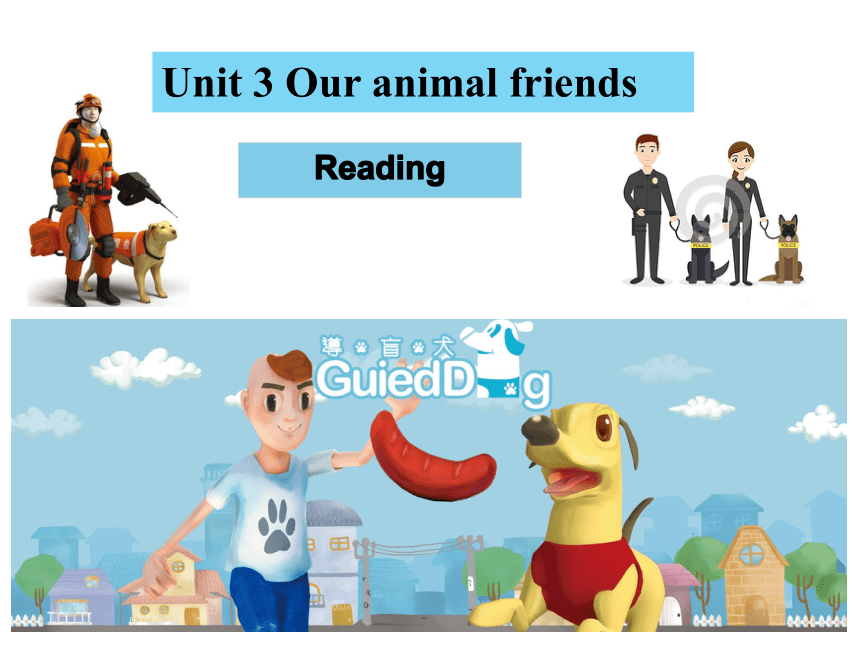 | |
| 格式 | ppt | ||
| 文件大小 | 16.8MB | ||
| 资源类型 | 教案 | ||
| 版本资源 | 牛津深圳版 | ||
| 科目 | 英语 | ||
| 更新时间 | 2021-04-08 16:22:28 | ||
图片预览

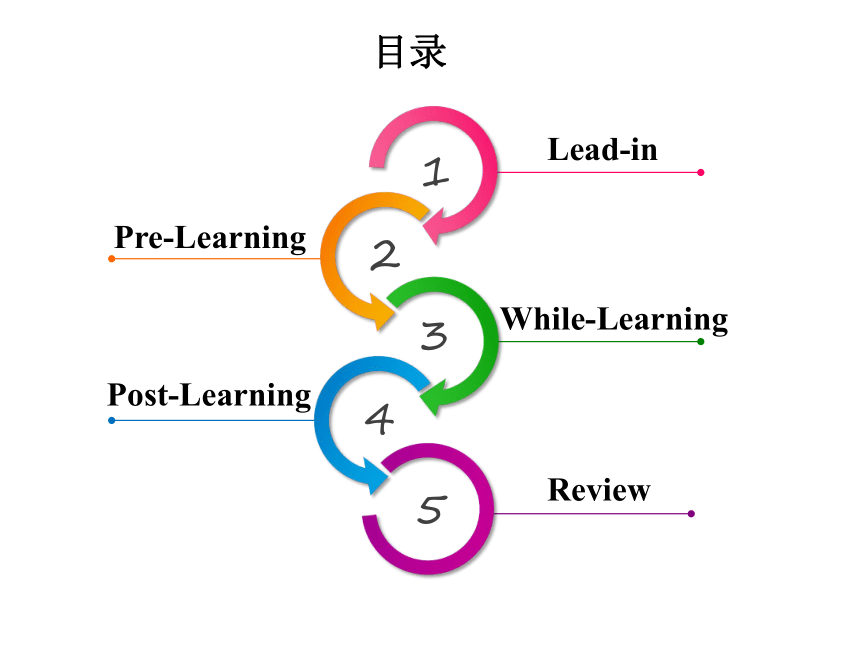
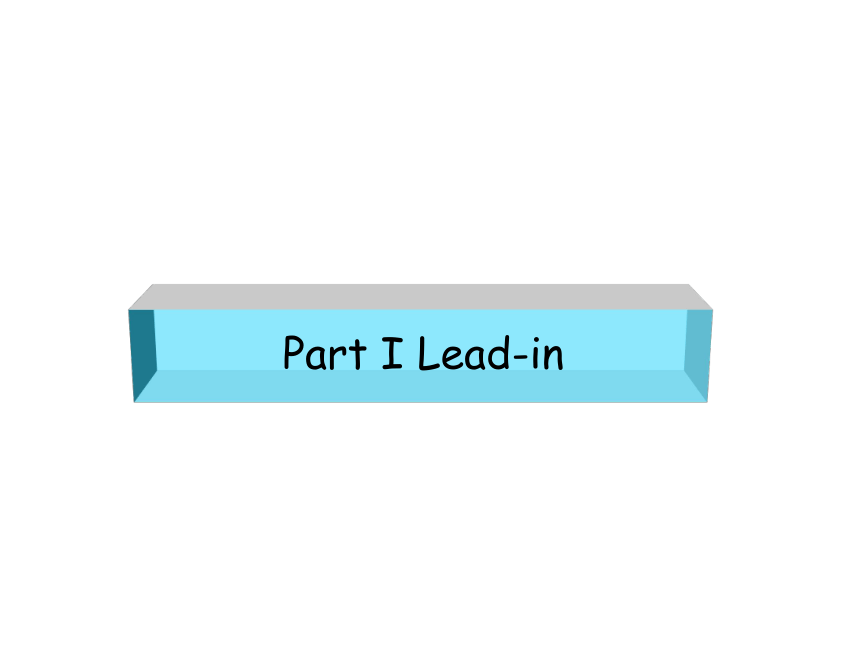
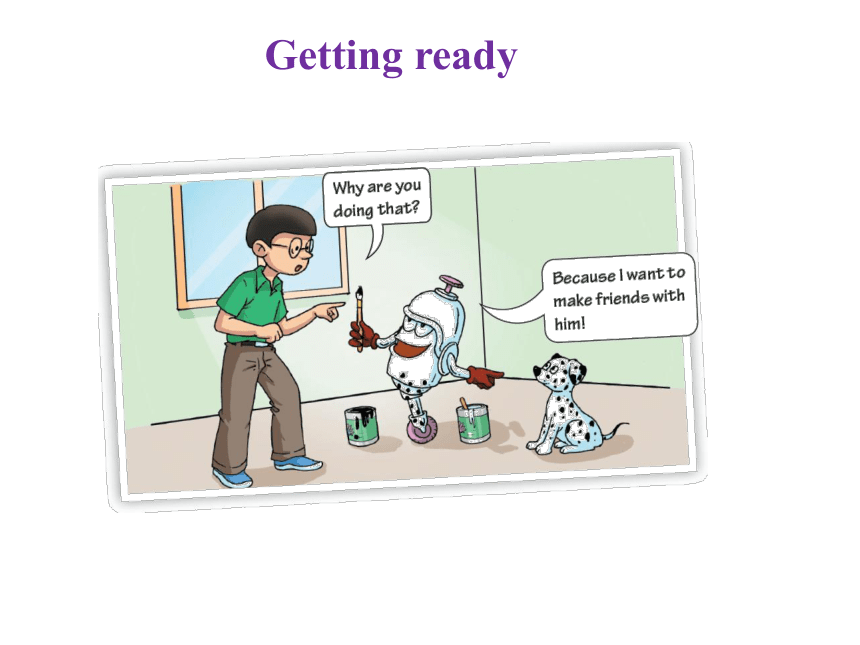
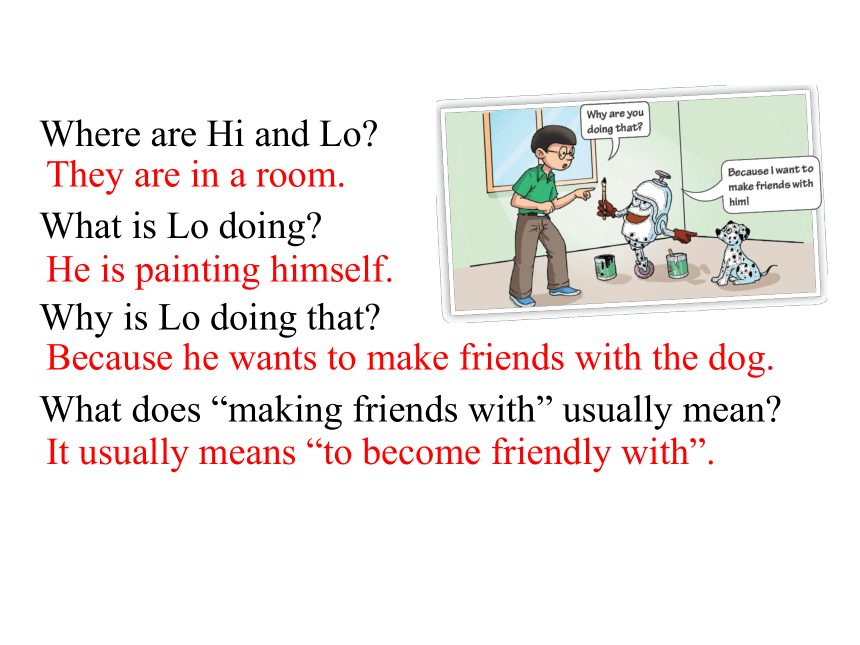
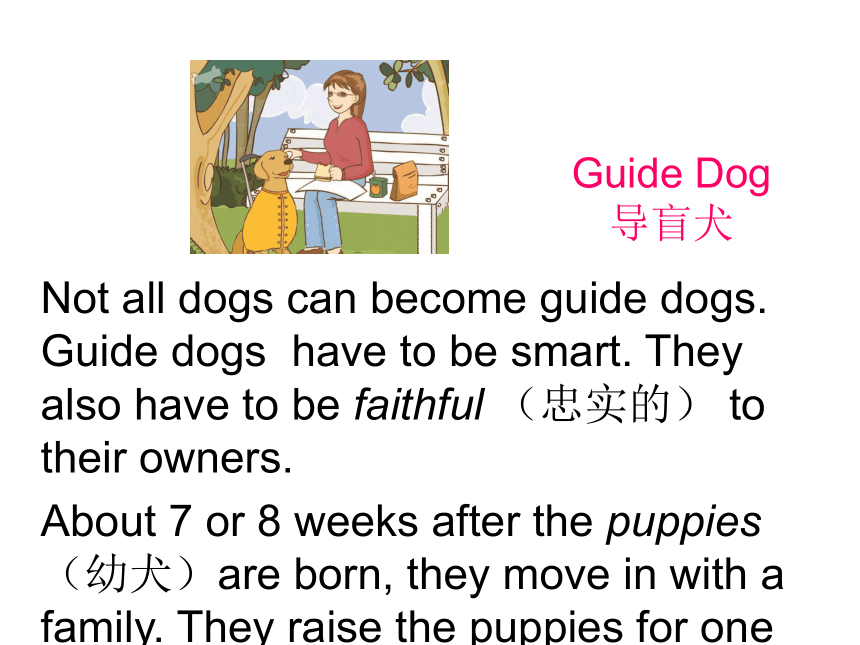

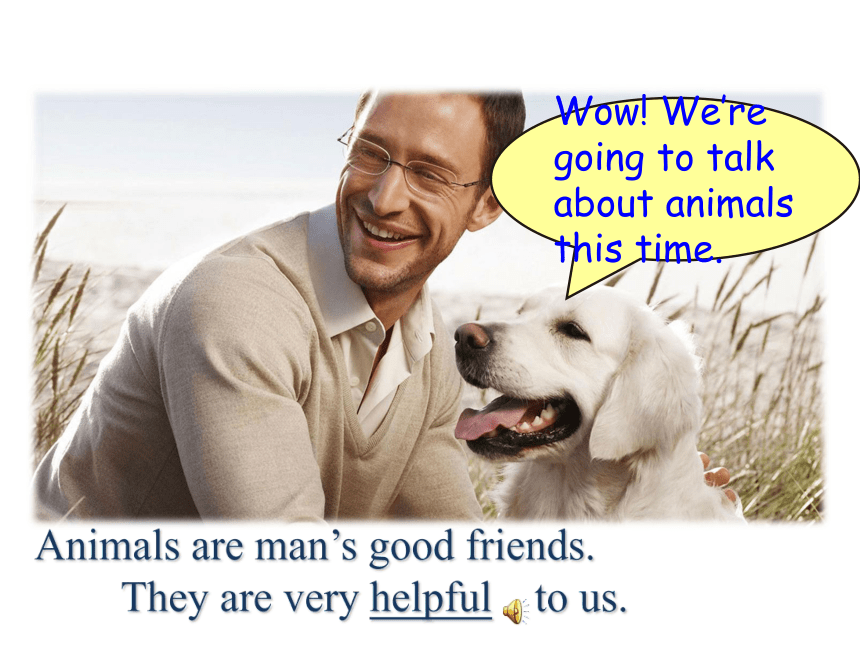
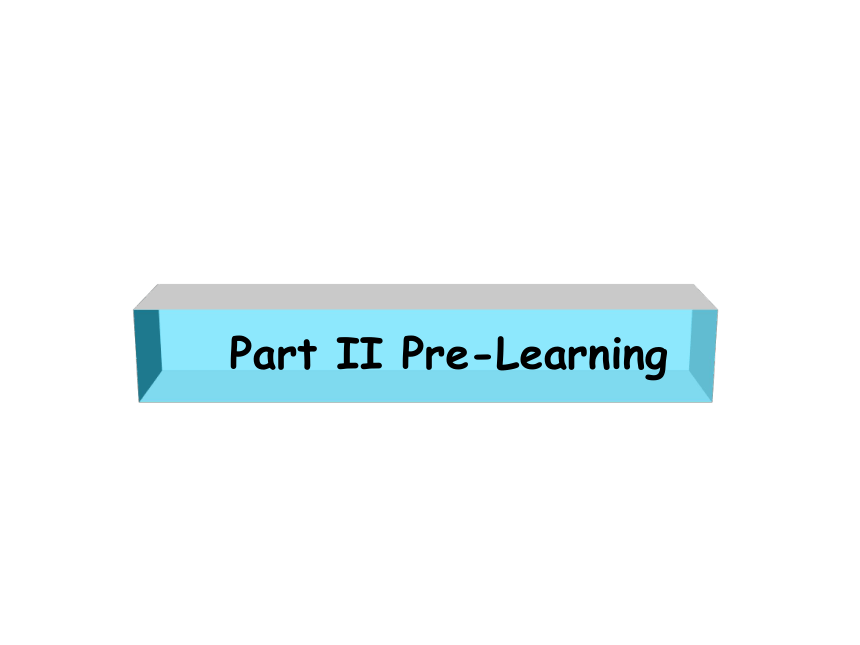
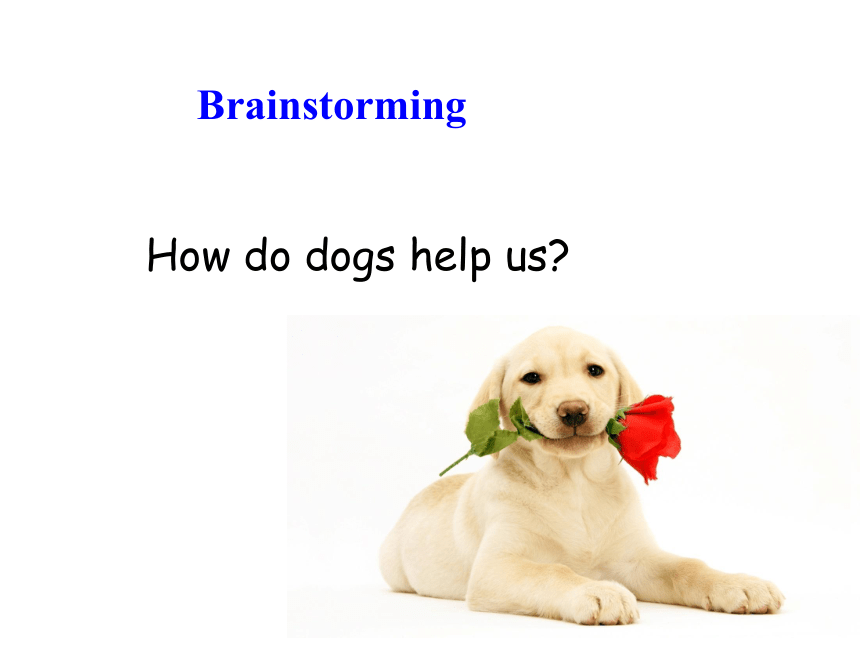
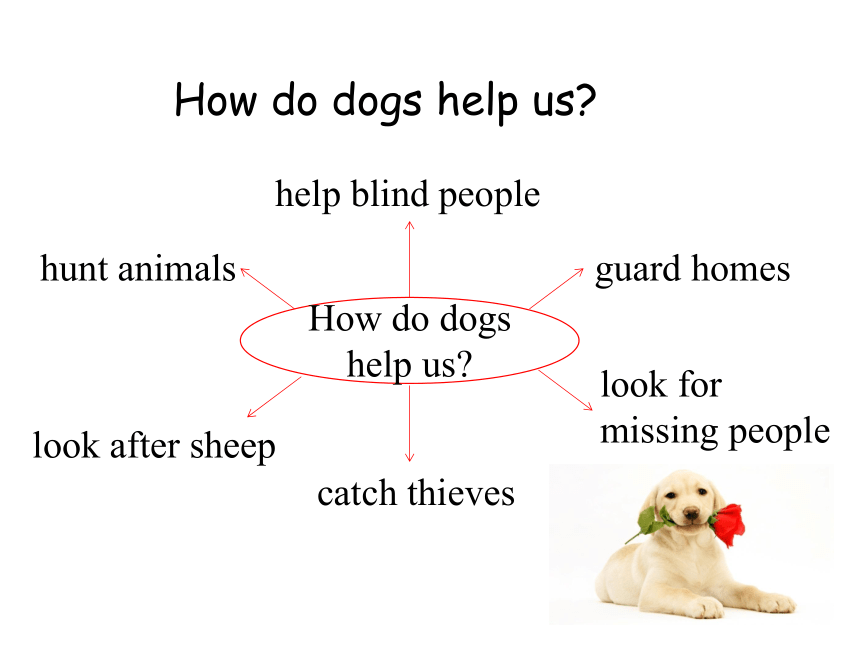
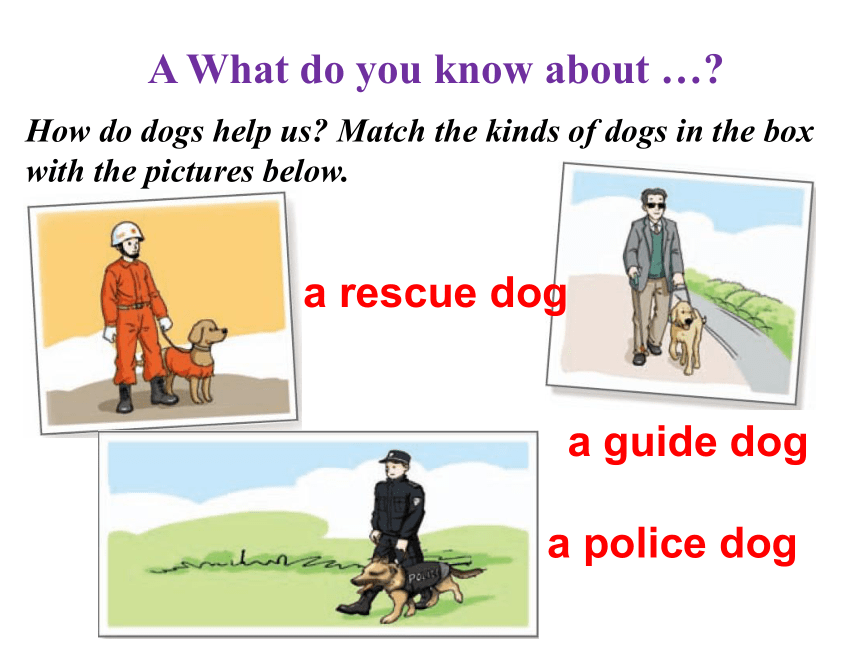
文档简介
Unit 3 Our animal friends
1
2
3
4
5
目录
Lead-in
Pre-Learning
While-Learning
Post-Learning
Review
Part I Lead-in
Getting ready
Where are Hi and Lo?
What is Lo doing?
Why is Lo doing that?
What does “making friends with” usually mean?
They are in a room.
He is painting himself.
Because he wants to make friends with the dog.
It usually means “to become friendly with”.
Guide Dog
导盲犬
Not all dogs can become guide dogs. Guide dogs have to be smart. They also have to be faithful (忠实的) to their owners.
About 7 or 8 weeks after the puppies(幼犬)are born, they move in with a family. They raise the puppies for one year. The puppies will learn to get along with other people.
After one year, it is time for the puppies to return to school. They need to receive special training. They learn to make sure their owners are safe wherever they go. They learn how to obey orders(服从命令). They learn how to wait for the traffic lights to change.
Animals are man’s good friends.
They are very helpful to us.
Wow! We’re going to talk about animals this time.
Part II Pre-Learning
Brainstorming
How do dogs help us?
How do dogs help us?
How do dogs help us?
help blind people
catch thieves
look for
missing people
guard homes
hunt animals
look after sheep
a rescue dog
a police dog
a guide dog
How do dogs help us? Match the kinds of dogs in the box with the pictures below.
A What do you know about …?
Q&A about dogs
What does a police dog do?
A police dog helps the police catch bad people.
What does a rescue dog do?
A rescue dog helps rescue people in times of danger.
What does a guide dog do?
A guide dog helps lead blind people and barks when there is danger.
A blind man and his “eyes” in a fire
Look at the photos and the title of the story on page 31. Then answer the questions below.
What do you think the word “eyes” means in the story?
What is the story probably about?
It means the blind man’s dog.
It is probably about a fire.
Before you read
Part III While-Learning
First Reading
John and Charlie arrived at the hotel in the afternoon. _____
Charlie was very tired and fell asleep very soon. _____
John and Charlie got down on the floor and waited for help. _____
John and Charlie got down on the floor and waited for help. _____
The fireman saved both John and Charlie. _____
F
T
F
F
T
Listen to the text . Answer the True or False questions.
Second Reading
“Good evening, sir,” said the receptionist. “You’re welcome to stay, but I’m sorry that we don’t allow pets here.”
“Charlie isn’t a pet,” said John. “He’s my eyes. I’m blind and I can’t go anywhere by myself .”
The receptionist apologized and led John and Charlie to their room.
One day, John Dancer and Charlie arrived at a hotel.
A blind man and his “eyes” in a fire
Read Paragraph 1-3 and answer the questions.
Did the receptionist want to allow Charlie to stay in the hotel? Why or why not?
What is Charlie?
What did the receptionist do then?
No. The hotel doesn’t allow pets to stay there.
Charlie is John’s guide dog/ “eyes”.
He apologized and led John and Charlie to their room.
With Charlie’s help, John put some wet towels along the bottom of the door. Then he got down on the floor next to Charlie and waited.
John was very tired. He soon fell asleep. Some time later, Charlie started barking. John woke up and smelt smoke. A fire! Smoke started to come in from under the door.
Read Paragraph 4-5 and fill in the following table.
Soon he heard the sound of a fire engine. A fireman arrived and got him out of the building, but the fireman did not want to take Charlie. John would not go without his “eyes”.
Finally, the fireman got Charlie out of the building too and they were both safe.
What happened then?
John was very tired.?
Charlie started
barking.?
Smoke started to come in from under the door.?
The fireman didn’t want to take Charlie.?
Finally, the fireman got Charlie out of the building too.?
He soon fell asleep.
John woke up and smelt
smoke.
With Charlie’s help, John put some wet towels along the bottom of the door. Then he got down on the floor next to Charlie and waited.
John would not go without his “eyes”.
They were both safe.
Work in pairs. Rearrange the following sentences.
At last, they were both safe on the ground.
John smelt smoke.
The fireman didn’t want to take Charlie.
John heard the sound of a fire engine.
John and Charlie arrived at the hotel.
John put some wet towels along the bottom of the door.
The receptionist didn’t allow Charlie into the hotel.
The receptionist apologized and led them to the room.
Charlie woke John up.
John explained that Charlie was his “eyes”.
John fell asleep.
e
g
j
h
k
i
b
f
d
c
a
Work in groups. Complete the table.
Time & Place
_____________ ____________
Main characters
__________________________
__________________________
__________________________
Story
1. John and Charlie _______________.
2. The receptionist ___________ at first.
3. The receptionist led them __their room.
4. John _______ soon because he was __.
5. Charlie _____ because there was a fire
and John _________.
6. John put some wet towels along the
bottom of the door with ____________.
7. A fireman saved __________________.
one evening
at a hotel
1. John Dancer – the blind man
2. Charlie – John’s guide dog
3. a receptionist at the hotel
4. a fireman
arrived at a hotel
did not allow Charlie into the hotel
to
fell asleep
very tired
barked
woke up
Charlie’s help
both John and Charlie
Third Reading
Let’s learn the new words and expressions.
blind adj. 瞎的;失明的
radio n. 无线电广播
programme n. 节目
helpful adj. 有用的;有帮助的
*rescue n. 营救
New words and expressions
P29-33
mean v. (过去式meant) 表 示……的意思
*receptionist n. 接待员
allow v.允许进入(或出去、通过)
pet n. 宠物
anywhere adv. 任何地方
apologize v. 道歉
lead v. (过去式led) 带领
bark v. (狗) 吠叫
wake v. (过去式woke) 醒来
towel n.毛巾
bottom n. 底部
finally adv. 终于;最后
arrive at 到达
by oneself 独自
lead (sb) to 带着(某人) 到……
fall asleep 入睡
wake up 醒来
get down 蹲下;趴下
fire engine 消防车
1. arrive at 到达
1)arrive 是不及物动词,不能直接接地点名词作宾语,要用“arrive at / in +地点”表示到达某地;
一般来说,arrive at 后面接小地方,如学校、
饭堂、图书馆等;
arrive in 后面接大地方,如城市、国家等。例如:
My father arrives at his office at eight o’clock
every morning.
我爸爸每天早上八点钟到办公室。
2)reach作及物动词时,意为“到达”,后面直接接地点名词。
例如:
What time did you reach school this morning?
今天早上你几点到达学校?
3)get to 后面可接地点名词。
例如:
I will get to the library at 10 a.m. tomorrow.
我明天早上十点钟到图书馆。
注意:后面接here、there、home 等副词时,arrive at / in和get to都要省略介词。
例如:
My mother usually arrive/gets home at 6 p.m. after
work.
我妈妈下班后通常六点钟到家。
I. 选用in或at填空,不用填的用“/”表示。
1. They will arrive ____ Paris next Monday.
2. We arrived ____ the station five minutes late.
3. It will take us five hours to arrive ____ there.
Practice
/
in
at
II. 选用reach, arrive (at / in)或get (to)填空,并注意其形式。
(1) He’ll call me as soon as he __________________there.
(2) It was late at night when my father ______.
(3) When I ______________________ the station, the train was about to leave the station.
reaches / arrives / gets
arrived
reached / arrived at / got to
2. You’re welcome to stay, but I’m sorry
that we don’t allow pets here.”
欢迎您的入住,但是抱歉,我们酒店不
允许宠物入内。
①welcome 是形容词,意为“受到欢
迎的”。
如:随时都欢迎你来我们店。
You are always welcome to our shop.
注意:
sb be welcome to do sth
表示“ 欢迎某人做某事”
sb be welcome to some place
表示“欢迎某人来某地” 如:
欢迎外国人参观广州。
Foreigners are welcome to visit Guangzhou.
欢迎您来中国。
You are welcome to China.
根据中文意思完成句子。
1. 我不欢迎陌生人来我家。
Strangers _____ _______ _____my house.
2. 欢迎你来我的花园品茶。
_____ ________ _____ my garden to have some tea.
You’re welcome to
aren’t welcome to
Practice
② sb is sorry + that +从句”
意为“某人为……感到抱歉/遗憾”,从
句的内容表示感到抱歉/遗憾的原因。如:
He is sorry that he has made so many
mistakes.
他很抱歉犯了这么多的错误。
根据中文意思完成句子。
1. 很抱歉,我们明天去不了你的生日聚会。
We _____ _____ _____ we can’t go to your
birthday party tomorrow.
2. 很抱歉,我昨天打破了你的玻璃杯。
_____ _____ _____ _____ I broke your
glass yesterday.
I am sorry that
are sorry that
Practice
③ allow v.允许进入(或出去、通过)
他的父母不允许他在外面待得很晚。
His parents don't allow him to stay out
late.
allow sb to do sth 允许某人做某事
如:
Our teacher allows us to go out for a walk.
我们的老师允许我们出去散步。
④pet n. 宠物
他养了只狗作为宠物。
He keeps a dog as a pet.
3. I can’t go anywhere by myself.
我不能独自去任何地方。
① anywhere adv. 任何地方
随便坐吧!
Sit anywhere you like!
当用于否定句,疑问句或条件句中,意为“什么地方”。
上周六你去了什么地方了吗?
Did you go anywhere last Saturday?
not … anywhere = nowhere 如:
I can’t go anywhere.
= I can go nowhere.
我哪里也去不了。
② by oneself 意为“独自”,常用于句
尾,相当于alone,两者可以互换使用。
我们应该独自完成家庭作业。
We should do our homework by ourselves.
= We should do our homework alone.
注意oneself 的变化要与主语的人称一致。
I. 同义句转换。
If you are busy, I can go there alone.
If you are busy, I can go there ____ _______.
II. 选择最佳答案填空。
( )She usually cooks meals by _____.
A. she B. her C. hers D. herself
by myself
D
Practice
III. 根据中文意思完成句子。
他不得不自己完成这项工作。
He has to finish the work _____ _______.
by himself
11. The receptionist apologized and led
John and Charlie to their room.
接待员道了歉,然后把约翰和查理带去他们
的房间。
①apologize v. 道歉
apologize to sb. for sth. 因为…向某人道歉
他因迟到向我们道歉。
He apologized to us for coming late.
②lead v. (过去式led) 带领
led (sb.) to 带着(某人)到……
接待员带我们来到会议室。
The receptionist led us to the meeting room.
13. Some time later, Charlie started barking.
一段时间之后,查利开始吠叫起来。
① some time意为“一段时间;一些时间”。
【辨析】
词汇
用法
some time
名词词组,意为“一段/些间”。
sometime
副词,意为“(过去或将来的)某个时候”。
some times
名词词组,意为“几次;几倍”。
sometimes
副词,意为“有时”。
如:
We plan to stay in Hainan for some time.
我们打算在海南待一段时间。
Tom will visit his uncle sometime.
汤姆将会找个时间去探望他的叔叔。
Your room is some times bigger than mine.
你的房间比我的大几倍。
I sometimes have supper in this restaurant.
我有时会在这家餐馆吃晚饭。
选用some time,sometime,some times 或
sometimes填空。
1. He __________ plays basketball with his
friends after school.
2. We can talk about it now. We still have
__________.
3. You will understand your mother _________
in the future.
4. He has been to Beijing ___________ before.
Practice
sometimes
some time
sometime
some times
②later 在本句中作副词,意为“后来;之
后”。表示“……之后”的词还有in和after。
【辨析】
一般用法
句子时态
时间段+ later
一般将来时或一般过去时
in +时间段
一般将来时
after +时间段或
时间点
一般将来时或一般过去时
如:
He will go to Shanghai two days later.
= He will go to Shanghai in two days.
两天后,他将要去上海。
Two days later, he went to Shanghai.
= After two days, he went to Shanghai.
两天后,他去了上海。
He will go to Shanghai after two o’clock.
两点钟之后,他将要去上海。
选用later,in或after填空。
1. A week ____ , he returned the book to me.
2. I will finish my homework ___ half an hour.
3. The whole class will go to clean the
street _______ half past nine.
4. Half a month _______ , he will come back.
Practice
later
in
after
later
6. With Charlie’s help, John put some wet
towels along the bottom of the door.
在查理的帮助下,约翰沿着门底放了一些湿
毛巾。
with sb's help =with the help of sb意为“在某
人的帮助下”,常置于句首。
With my teacher's help, I did better in my
studies.
= With the help of my teacher, I did better in my
studies.
在我的老师的帮助下,我的学习更好了。
I. 选择最佳答案填空。
( ) ____ the help of Lucy, I finished the
work on time.
A. In B. On C. At D. With
D
Practice
7. You’d better look after him or you won’t be
allowed in the park again!
你最好看管好他,否则你将不再获准进入这个
公园!
① 肯定形式:you’d better do sth = you had better do sth 你最好做某事
否定形式:you’d better not do sth=you had
better not do sth 你最好不要做某事
You’d better not play with fire.
你最好不要玩火。
②or 在本句中意为“否则;不然”,引导结果
状语从句,表示如果主句中阐述的事情做不到,
就会导致从句中阐述的后果。如:
Hurry up! Or you’ll be late for school.
快点!否则你上学就迟到了。
1. A blind person is ____.
a. not able to see b. not able to hear
2. If I do something by myself, I do it ____.
a. without help
b. with help
Vocabulary
C1 The words in italics are from the story
on page 31. Circle the correct answers to
complete these sentences.
a
a
3. When you apologize to someone, you say
"____" to him or her.
a. Thank you b. Sorry
4. If a person leads you to a place, he or she
____ you there.
a. takes b. keeps
5. If someone wakes up, he or she ____.
a. starts sleeping b. stops sleeping
b
a
b
C2 Complete the passage below with the words from the box.
It was a nice day today, so I took my pet dog, Flash,
to the park. It was hot. I _________ under a tree.
When I ________, I couldn’t see Flash ________! I looked
around the park and then I saw him; he was barking loudly
at an old man! I stopped him.
The park keeper came over and said, “You’d better look
after him or you won’t be ________ in the park again!”
I __________ to the old man and the park keeper and
took Flash home.
allowed apologized woke up anywhere fell asleep
fell asleep
woke up
anywhere
allowed
apologized
Comprehension
2
1
3
4
5
6
Try to describe every picture.
The receptionist didn't allow
Charlie to stay in the hotel.
The receptionist apologized
and let Charlie to the room.
Try to describe every picture.
Some time later,
Charlie started barking.
Then he got down on the floor
next to Charlie and waited.
Try to describe every picture.
A fireman arrived and got him
out of the building, but the
fireman did not want to
take Charlie.
Finally, the firemen got Charlie
out of the building too and they
were both safe.
Part IV Post-Learning
Group discussion
*D2 Did John save Charlie or did Charlie save John? Discuss this with your classmates.
Possible answers
Charlie saved John.---- Charlie baked to wake John up when the fire started. Charlie helped John put some wet towels along the bottom of the door.
John saved Charlie.---- The fireman did not want to take Charlie. John would not go without Charlie. Finally, the firemen got Charlie out of the building too and they were both safe.
Look at the pictures and retell the
story. Pretend that you are John
and retell it in the first person.
Search the text to find verbs in the past tense. Put them in the correct columns below.
arrive-arrived
apologize-
apologized
start-started
say-said
lead-led
fall-fell
wake-woke
smell-smelt
put-put
get-got
hear-heard
will-would
be-was
be-were
do-did
The firemen arrived in the scene of the fire and rescued them.
Wrong sentence
Mistake
arrived in
Why
arrive in后面一般加较大的地方,如国家,省份,城市等。arrive at后面一般加较小的地方,如车站、机场、村庄、学校等。若后面没有地点或跟方位副词则不需要加介词。
Correct sentence
The firemen arrived at the scene of the fire and rescued them.
Sentence 1
Strategy training
Most girls’ parents don’t allow them stay out late.
allow与let意思相近,但在使用上有区别:let sb. do sth.;allow sb. to do sth.。
Sentence 2
allow them stay
Most girls’ parents don’t allow them to stay out late.
Wrong sentence
Mistake
Why
Correct sentence
Ross hates Maths, and he always falls sleepy in Maths classes.
sleepy---形容词, “困倦的;瞌睡的”。feel sleepy---“感到有睡意,但没有睡着”。asleep---形容词,只能作表语, “睡着的”。fall asleep是动词词组,意为“睡着了”。
Sentence 3
falls sleepy
Ross hates Maths, and he always falls asleep in Maths classes.
Wrong sentence
Mistake
Why
Correct sentence
Conclusion
From these sentences, we’ve learnt that:
Part V Review
Dictation
blind
radio
programme
heplful
rescue
mean
receptionist
allow
瞎的;失明的
无线电广播
节目
有用的;有帮助的
营救
表示……的意思
接待员
允许进入(或出去、通过)
pet
anywhere
apologize
lead
bark
wake
towel
bottom
finally
宠物
任何地方
道歉
带领
(狗)吠叫
醒来
毛巾
底部
终于;最后
arrive at
by oneself
lead (sb.)to
fall asleep
wake up
get down
fire engine
到达
独自
带着(某人)到……
入睡
醒来
蹲下;趴下
消防车
一、根据下列句子及所给单词的首字母写出
所缺单词,注意其形式。
1. I had no TVs or computers when I was a
child. I often listened to the r______ at that
time.
2. My mother doesn't a______ my father to
smoke at home, so my father has to smoke
outside.
adio
llow
3. Yesterday afternoon I helped a b______ old
man cross the street and my mother said I was
a good boy.
4. What do you think the word "UFO" m______ ?
5. Many children like to keep little rabbits as
p______.
ets
lind
ean
二、选择最佳答案填空。
( )1. We are going to have a trip to the seaside
____ Saturday morning. And ____ next
Saturday morning,we will go to Zengcheng
and visit the Baishui Fairy falls.
A. in, on B. on, in C. on, / D. in, /
( )2. — What did you do last night, Sam?
— I did my homework by ____.
A. me B. my
C. mine D. myself
C
D
( )3. He soon ____ when he was watching the
boring TV programme.
A. fall asleep B. fell asleep
C. felt asleep D. was falling asleep
( )4. He is just ____ the letter.
A. starting to write B. started to write
C. starts writing D. started writing
A
B
三、根据中文意思完成句子。
1. 昨晚我们11点半到达北京机场。
We ______ ____ the Beijing Airport at 11:30
last night.
2. 我昨天晚上独自完成作业.
I ____ my homework ____ _______ last night.
3. 妈妈经常带我去白云山。
Mother often ____ ____ ____ the Baiyun
Mountain.
arrived at
did / by myself
finished
leads me to
4. 我太累了,以致在开车去上班的途中差点
睡着了。
I was so tired that I almost ____ ______ when I drove to work.
5. 在圣诞节那天,当她醒来时发现床上有个
玩具熊。
She ____ a toy bear on her bed when she ____
____ on Christmas Day.
found woke up
fell asleep
Thank you!
1
2
3
4
5
目录
Lead-in
Pre-Learning
While-Learning
Post-Learning
Review
Part I Lead-in
Getting ready
Where are Hi and Lo?
What is Lo doing?
Why is Lo doing that?
What does “making friends with” usually mean?
They are in a room.
He is painting himself.
Because he wants to make friends with the dog.
It usually means “to become friendly with”.
Guide Dog
导盲犬
Not all dogs can become guide dogs. Guide dogs have to be smart. They also have to be faithful (忠实的) to their owners.
About 7 or 8 weeks after the puppies(幼犬)are born, they move in with a family. They raise the puppies for one year. The puppies will learn to get along with other people.
After one year, it is time for the puppies to return to school. They need to receive special training. They learn to make sure their owners are safe wherever they go. They learn how to obey orders(服从命令). They learn how to wait for the traffic lights to change.
Animals are man’s good friends.
They are very helpful to us.
Wow! We’re going to talk about animals this time.
Part II Pre-Learning
Brainstorming
How do dogs help us?
How do dogs help us?
How do dogs help us?
help blind people
catch thieves
look for
missing people
guard homes
hunt animals
look after sheep
a rescue dog
a police dog
a guide dog
How do dogs help us? Match the kinds of dogs in the box with the pictures below.
A What do you know about …?
Q&A about dogs
What does a police dog do?
A police dog helps the police catch bad people.
What does a rescue dog do?
A rescue dog helps rescue people in times of danger.
What does a guide dog do?
A guide dog helps lead blind people and barks when there is danger.
A blind man and his “eyes” in a fire
Look at the photos and the title of the story on page 31. Then answer the questions below.
What do you think the word “eyes” means in the story?
What is the story probably about?
It means the blind man’s dog.
It is probably about a fire.
Before you read
Part III While-Learning
First Reading
John and Charlie arrived at the hotel in the afternoon. _____
Charlie was very tired and fell asleep very soon. _____
John and Charlie got down on the floor and waited for help. _____
John and Charlie got down on the floor and waited for help. _____
The fireman saved both John and Charlie. _____
F
T
F
F
T
Listen to the text . Answer the True or False questions.
Second Reading
“Good evening, sir,” said the receptionist. “You’re welcome to stay, but I’m sorry that we don’t allow pets here.”
“Charlie isn’t a pet,” said John. “He’s my eyes. I’m blind and I can’t go anywhere by myself .”
The receptionist apologized and led John and Charlie to their room.
One day, John Dancer and Charlie arrived at a hotel.
A blind man and his “eyes” in a fire
Read Paragraph 1-3 and answer the questions.
Did the receptionist want to allow Charlie to stay in the hotel? Why or why not?
What is Charlie?
What did the receptionist do then?
No. The hotel doesn’t allow pets to stay there.
Charlie is John’s guide dog/ “eyes”.
He apologized and led John and Charlie to their room.
With Charlie’s help, John put some wet towels along the bottom of the door. Then he got down on the floor next to Charlie and waited.
John was very tired. He soon fell asleep. Some time later, Charlie started barking. John woke up and smelt smoke. A fire! Smoke started to come in from under the door.
Read Paragraph 4-5 and fill in the following table.
Soon he heard the sound of a fire engine. A fireman arrived and got him out of the building, but the fireman did not want to take Charlie. John would not go without his “eyes”.
Finally, the fireman got Charlie out of the building too and they were both safe.
What happened then?
John was very tired.?
Charlie started
barking.?
Smoke started to come in from under the door.?
The fireman didn’t want to take Charlie.?
Finally, the fireman got Charlie out of the building too.?
He soon fell asleep.
John woke up and smelt
smoke.
With Charlie’s help, John put some wet towels along the bottom of the door. Then he got down on the floor next to Charlie and waited.
John would not go without his “eyes”.
They were both safe.
Work in pairs. Rearrange the following sentences.
At last, they were both safe on the ground.
John smelt smoke.
The fireman didn’t want to take Charlie.
John heard the sound of a fire engine.
John and Charlie arrived at the hotel.
John put some wet towels along the bottom of the door.
The receptionist didn’t allow Charlie into the hotel.
The receptionist apologized and led them to the room.
Charlie woke John up.
John explained that Charlie was his “eyes”.
John fell asleep.
e
g
j
h
k
i
b
f
d
c
a
Work in groups. Complete the table.
Time & Place
_____________ ____________
Main characters
__________________________
__________________________
__________________________
Story
1. John and Charlie _______________.
2. The receptionist ___________ at first.
3. The receptionist led them __their room.
4. John _______ soon because he was __.
5. Charlie _____ because there was a fire
and John _________.
6. John put some wet towels along the
bottom of the door with ____________.
7. A fireman saved __________________.
one evening
at a hotel
1. John Dancer – the blind man
2. Charlie – John’s guide dog
3. a receptionist at the hotel
4. a fireman
arrived at a hotel
did not allow Charlie into the hotel
to
fell asleep
very tired
barked
woke up
Charlie’s help
both John and Charlie
Third Reading
Let’s learn the new words and expressions.
blind adj. 瞎的;失明的
radio n. 无线电广播
programme n. 节目
helpful adj. 有用的;有帮助的
*rescue n. 营救
New words and expressions
P29-33
mean v. (过去式meant) 表 示……的意思
*receptionist n. 接待员
allow v.允许进入(或出去、通过)
pet n. 宠物
anywhere adv. 任何地方
apologize v. 道歉
lead v. (过去式led) 带领
bark v. (狗) 吠叫
wake v. (过去式woke) 醒来
towel n.毛巾
bottom n. 底部
finally adv. 终于;最后
arrive at 到达
by oneself 独自
lead (sb) to 带着(某人) 到……
fall asleep 入睡
wake up 醒来
get down 蹲下;趴下
fire engine 消防车
1. arrive at 到达
1)arrive 是不及物动词,不能直接接地点名词作宾语,要用“arrive at / in +地点”表示到达某地;
一般来说,arrive at 后面接小地方,如学校、
饭堂、图书馆等;
arrive in 后面接大地方,如城市、国家等。例如:
My father arrives at his office at eight o’clock
every morning.
我爸爸每天早上八点钟到办公室。
2)reach作及物动词时,意为“到达”,后面直接接地点名词。
例如:
What time did you reach school this morning?
今天早上你几点到达学校?
3)get to 后面可接地点名词。
例如:
I will get to the library at 10 a.m. tomorrow.
我明天早上十点钟到图书馆。
注意:后面接here、there、home 等副词时,arrive at / in和get to都要省略介词。
例如:
My mother usually arrive/gets home at 6 p.m. after
work.
我妈妈下班后通常六点钟到家。
I. 选用in或at填空,不用填的用“/”表示。
1. They will arrive ____ Paris next Monday.
2. We arrived ____ the station five minutes late.
3. It will take us five hours to arrive ____ there.
Practice
/
in
at
II. 选用reach, arrive (at / in)或get (to)填空,并注意其形式。
(1) He’ll call me as soon as he __________________there.
(2) It was late at night when my father ______.
(3) When I ______________________ the station, the train was about to leave the station.
reaches / arrives / gets
arrived
reached / arrived at / got to
2. You’re welcome to stay, but I’m sorry
that we don’t allow pets here.”
欢迎您的入住,但是抱歉,我们酒店不
允许宠物入内。
①welcome 是形容词,意为“受到欢
迎的”。
如:随时都欢迎你来我们店。
You are always welcome to our shop.
注意:
sb be welcome to do sth
表示“ 欢迎某人做某事”
sb be welcome to some place
表示“欢迎某人来某地” 如:
欢迎外国人参观广州。
Foreigners are welcome to visit Guangzhou.
欢迎您来中国。
You are welcome to China.
根据中文意思完成句子。
1. 我不欢迎陌生人来我家。
Strangers _____ _______ _____my house.
2. 欢迎你来我的花园品茶。
_____ ________ _____ my garden to have some tea.
You’re welcome to
aren’t welcome to
Practice
② sb is sorry + that +从句”
意为“某人为……感到抱歉/遗憾”,从
句的内容表示感到抱歉/遗憾的原因。如:
He is sorry that he has made so many
mistakes.
他很抱歉犯了这么多的错误。
根据中文意思完成句子。
1. 很抱歉,我们明天去不了你的生日聚会。
We _____ _____ _____ we can’t go to your
birthday party tomorrow.
2. 很抱歉,我昨天打破了你的玻璃杯。
_____ _____ _____ _____ I broke your
glass yesterday.
I am sorry that
are sorry that
Practice
③ allow v.允许进入(或出去、通过)
他的父母不允许他在外面待得很晚。
His parents don't allow him to stay out
late.
allow sb to do sth 允许某人做某事
如:
Our teacher allows us to go out for a walk.
我们的老师允许我们出去散步。
④pet n. 宠物
他养了只狗作为宠物。
He keeps a dog as a pet.
3. I can’t go anywhere by myself.
我不能独自去任何地方。
① anywhere adv. 任何地方
随便坐吧!
Sit anywhere you like!
当用于否定句,疑问句或条件句中,意为“什么地方”。
上周六你去了什么地方了吗?
Did you go anywhere last Saturday?
not … anywhere = nowhere 如:
I can’t go anywhere.
= I can go nowhere.
我哪里也去不了。
② by oneself 意为“独自”,常用于句
尾,相当于alone,两者可以互换使用。
我们应该独自完成家庭作业。
We should do our homework by ourselves.
= We should do our homework alone.
注意oneself 的变化要与主语的人称一致。
I. 同义句转换。
If you are busy, I can go there alone.
If you are busy, I can go there ____ _______.
II. 选择最佳答案填空。
( )She usually cooks meals by _____.
A. she B. her C. hers D. herself
by myself
D
Practice
III. 根据中文意思完成句子。
他不得不自己完成这项工作。
He has to finish the work _____ _______.
by himself
11. The receptionist apologized and led
John and Charlie to their room.
接待员道了歉,然后把约翰和查理带去他们
的房间。
①apologize v. 道歉
apologize to sb. for sth. 因为…向某人道歉
他因迟到向我们道歉。
He apologized to us for coming late.
②lead v. (过去式led) 带领
led (sb.) to 带着(某人)到……
接待员带我们来到会议室。
The receptionist led us to the meeting room.
13. Some time later, Charlie started barking.
一段时间之后,查利开始吠叫起来。
① some time意为“一段时间;一些时间”。
【辨析】
词汇
用法
some time
名词词组,意为“一段/些间”。
sometime
副词,意为“(过去或将来的)某个时候”。
some times
名词词组,意为“几次;几倍”。
sometimes
副词,意为“有时”。
如:
We plan to stay in Hainan for some time.
我们打算在海南待一段时间。
Tom will visit his uncle sometime.
汤姆将会找个时间去探望他的叔叔。
Your room is some times bigger than mine.
你的房间比我的大几倍。
I sometimes have supper in this restaurant.
我有时会在这家餐馆吃晚饭。
选用some time,sometime,some times 或
sometimes填空。
1. He __________ plays basketball with his
friends after school.
2. We can talk about it now. We still have
__________.
3. You will understand your mother _________
in the future.
4. He has been to Beijing ___________ before.
Practice
sometimes
some time
sometime
some times
②later 在本句中作副词,意为“后来;之
后”。表示“……之后”的词还有in和after。
【辨析】
一般用法
句子时态
时间段+ later
一般将来时或一般过去时
in +时间段
一般将来时
after +时间段或
时间点
一般将来时或一般过去时
如:
He will go to Shanghai two days later.
= He will go to Shanghai in two days.
两天后,他将要去上海。
Two days later, he went to Shanghai.
= After two days, he went to Shanghai.
两天后,他去了上海。
He will go to Shanghai after two o’clock.
两点钟之后,他将要去上海。
选用later,in或after填空。
1. A week ____ , he returned the book to me.
2. I will finish my homework ___ half an hour.
3. The whole class will go to clean the
street _______ half past nine.
4. Half a month _______ , he will come back.
Practice
later
in
after
later
6. With Charlie’s help, John put some wet
towels along the bottom of the door.
在查理的帮助下,约翰沿着门底放了一些湿
毛巾。
with sb's help =with the help of sb意为“在某
人的帮助下”,常置于句首。
With my teacher's help, I did better in my
studies.
= With the help of my teacher, I did better in my
studies.
在我的老师的帮助下,我的学习更好了。
I. 选择最佳答案填空。
( ) ____ the help of Lucy, I finished the
work on time.
A. In B. On C. At D. With
D
Practice
7. You’d better look after him or you won’t be
allowed in the park again!
你最好看管好他,否则你将不再获准进入这个
公园!
① 肯定形式:you’d better do sth = you had better do sth 你最好做某事
否定形式:you’d better not do sth=you had
better not do sth 你最好不要做某事
You’d better not play with fire.
你最好不要玩火。
②or 在本句中意为“否则;不然”,引导结果
状语从句,表示如果主句中阐述的事情做不到,
就会导致从句中阐述的后果。如:
Hurry up! Or you’ll be late for school.
快点!否则你上学就迟到了。
1. A blind person is ____.
a. not able to see b. not able to hear
2. If I do something by myself, I do it ____.
a. without help
b. with help
Vocabulary
C1 The words in italics are from the story
on page 31. Circle the correct answers to
complete these sentences.
a
a
3. When you apologize to someone, you say
"____" to him or her.
a. Thank you b. Sorry
4. If a person leads you to a place, he or she
____ you there.
a. takes b. keeps
5. If someone wakes up, he or she ____.
a. starts sleeping b. stops sleeping
b
a
b
C2 Complete the passage below with the words from the box.
It was a nice day today, so I took my pet dog, Flash,
to the park. It was hot. I _________ under a tree.
When I ________, I couldn’t see Flash ________! I looked
around the park and then I saw him; he was barking loudly
at an old man! I stopped him.
The park keeper came over and said, “You’d better look
after him or you won’t be ________ in the park again!”
I __________ to the old man and the park keeper and
took Flash home.
allowed apologized woke up anywhere fell asleep
fell asleep
woke up
anywhere
allowed
apologized
Comprehension
2
1
3
4
5
6
Try to describe every picture.
The receptionist didn't allow
Charlie to stay in the hotel.
The receptionist apologized
and let Charlie to the room.
Try to describe every picture.
Some time later,
Charlie started barking.
Then he got down on the floor
next to Charlie and waited.
Try to describe every picture.
A fireman arrived and got him
out of the building, but the
fireman did not want to
take Charlie.
Finally, the firemen got Charlie
out of the building too and they
were both safe.
Part IV Post-Learning
Group discussion
*D2 Did John save Charlie or did Charlie save John? Discuss this with your classmates.
Possible answers
Charlie saved John.---- Charlie baked to wake John up when the fire started. Charlie helped John put some wet towels along the bottom of the door.
John saved Charlie.---- The fireman did not want to take Charlie. John would not go without Charlie. Finally, the firemen got Charlie out of the building too and they were both safe.
Look at the pictures and retell the
story. Pretend that you are John
and retell it in the first person.
Search the text to find verbs in the past tense. Put them in the correct columns below.
arrive-arrived
apologize-
apologized
start-started
say-said
lead-led
fall-fell
wake-woke
smell-smelt
put-put
get-got
hear-heard
will-would
be-was
be-were
do-did
The firemen arrived in the scene of the fire and rescued them.
Wrong sentence
Mistake
arrived in
Why
arrive in后面一般加较大的地方,如国家,省份,城市等。arrive at后面一般加较小的地方,如车站、机场、村庄、学校等。若后面没有地点或跟方位副词则不需要加介词。
Correct sentence
The firemen arrived at the scene of the fire and rescued them.
Sentence 1
Strategy training
Most girls’ parents don’t allow them stay out late.
allow与let意思相近,但在使用上有区别:let sb. do sth.;allow sb. to do sth.。
Sentence 2
allow them stay
Most girls’ parents don’t allow them to stay out late.
Wrong sentence
Mistake
Why
Correct sentence
Ross hates Maths, and he always falls sleepy in Maths classes.
sleepy---形容词, “困倦的;瞌睡的”。feel sleepy---“感到有睡意,但没有睡着”。asleep---形容词,只能作表语, “睡着的”。fall asleep是动词词组,意为“睡着了”。
Sentence 3
falls sleepy
Ross hates Maths, and he always falls asleep in Maths classes.
Wrong sentence
Mistake
Why
Correct sentence
Conclusion
From these sentences, we’ve learnt that:
Part V Review
Dictation
blind
radio
programme
heplful
rescue
mean
receptionist
allow
瞎的;失明的
无线电广播
节目
有用的;有帮助的
营救
表示……的意思
接待员
允许进入(或出去、通过)
pet
anywhere
apologize
lead
bark
wake
towel
bottom
finally
宠物
任何地方
道歉
带领
(狗)吠叫
醒来
毛巾
底部
终于;最后
arrive at
by oneself
lead (sb.)to
fall asleep
wake up
get down
fire engine
到达
独自
带着(某人)到……
入睡
醒来
蹲下;趴下
消防车
一、根据下列句子及所给单词的首字母写出
所缺单词,注意其形式。
1. I had no TVs or computers when I was a
child. I often listened to the r______ at that
time.
2. My mother doesn't a______ my father to
smoke at home, so my father has to smoke
outside.
adio
llow
3. Yesterday afternoon I helped a b______ old
man cross the street and my mother said I was
a good boy.
4. What do you think the word "UFO" m______ ?
5. Many children like to keep little rabbits as
p______.
ets
lind
ean
二、选择最佳答案填空。
( )1. We are going to have a trip to the seaside
____ Saturday morning. And ____ next
Saturday morning,we will go to Zengcheng
and visit the Baishui Fairy falls.
A. in, on B. on, in C. on, / D. in, /
( )2. — What did you do last night, Sam?
— I did my homework by ____.
A. me B. my
C. mine D. myself
C
D
( )3. He soon ____ when he was watching the
boring TV programme.
A. fall asleep B. fell asleep
C. felt asleep D. was falling asleep
( )4. He is just ____ the letter.
A. starting to write B. started to write
C. starts writing D. started writing
A
B
三、根据中文意思完成句子。
1. 昨晚我们11点半到达北京机场。
We ______ ____ the Beijing Airport at 11:30
last night.
2. 我昨天晚上独自完成作业.
I ____ my homework ____ _______ last night.
3. 妈妈经常带我去白云山。
Mother often ____ ____ ____ the Baiyun
Mountain.
arrived at
did / by myself
finished
leads me to
4. 我太累了,以致在开车去上班的途中差点
睡着了。
I was so tired that I almost ____ ______ when I drove to work.
5. 在圣诞节那天,当她醒来时发现床上有个
玩具熊。
She ____ a toy bear on her bed when she ____
____ on Christmas Day.
found woke up
fell asleep
Thank you!
